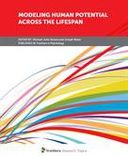Explore

Modeling Human Potential Across the Lifespan
0 Ungluers have
Faved this Work
Login to Fave
What is expertise? A modest answer implies good competence possessed by individuals with acknowledged skill. Although this interpretation implies adequate competence, a more precise definition signifies exclusive competence that experts are able to exhibit consistently. Such expertise falls within two categories: normatively exclusive expertise lies at the upper extreme of distributions for skills practiced by many people: another form refers to exclusive skills practiced by few people. Although both these forms typically show peak performance levels in early to mid-adulthood, objective comparisons outside this range often make use of age-graded categories. For example, competitions for junior and master athletes enable comparison of athletic prowess within categories pertaining to youth and later life, respectively. This Research Topic focuses on understanding human potential across the lifespan. Indicators of human potential include superior performances, relative to those by age peers, during given historical epochs. Examples used in previous research include record or top ranked performances in athletics and swimming, top ratings by chess players, high levels on objective measures of occupational or recreational performance, and superior laboratory performance after sustained periods of focussed deliberate practice. General modeling of such data indicates a necessity for sustained and focussed deliberate practice for the acquisition and maintenance of expertise. Focussed deliberate practice at the acquisition stage contributes to cognitive or physiological gains that enable transitions across a sequence of states relevant to expertise. Continuation of such practice contributes to the maintenance of expertise and, together with compensation and adaptation, helps to lessen performance loss beyond the period of peak performance. More specific models include those that emphasize the physiological underpinnings of expertise in different activities, cognitive techniques used to enhance performance, tactics within competitive activities, strategies pertaining to repeated performances, supportive influences on the development and retention of expertise, and statistical modeling of age trends. From a life span perspective, such modeling should take account of three temporal trends that, by consensus, provide the methodological foundations for lifespan research. These trends are historical transition (e.g., in participation rates and types of training in sport), cohort differences (i.e., cross-sectional trend) and age changes (i.e., longitudinal trend). Issues in modeling that require attention include (but are by no means limited to) the following: a) discussion about appropriate data analytic procedures to distinguish developmental and aging effects from those associated with cohort differences and historical era; for example, the extent to which developmental effects can be modelled for use in identifying talent in sport; b) investigation of the generalizability of findings from top performers: for example, the extent to which their age trends generalize to those of lesser ability; c) examination of issues related to attrition from databases of top performances: for example, attrition from such databases as age-class records and annual ‘Top N’ performance rankings arise from deletion of entries replaced by superior subsequent performances, in addition to reasons associated with morbidity, mortality, and loss of interest.
This book is included in DOAB.
Why read this book? Have your say.
You must be logged in to comment.
Rights Information
Are you the author or publisher of this work? If so, you can claim it as yours by registering as an Unglue.it rights holder.Downloads
This work has been downloaded 153 times via unglue.it ebook links.
- 44 - mobi (CC BY) at Unglue.it.
- 54 - epub (CC BY) at Unglue.it.
- 55 - pdf (CC BY) at Unglue.it.
Keywords
- age trends
- creativity
- Expertise
- Mathematics & science
- Psychology
- Science: general issues
- Society & Social Sciences
- sport
- successful aging
Links
DOI: 10.3389/978-2-88963-559-7Editions

